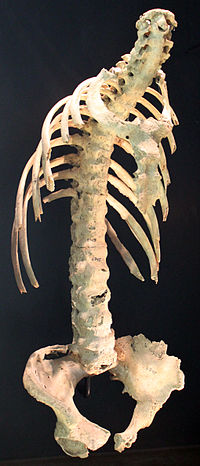
Photo from wikipedia
ABSTRACT Introduction Ankylosing spondylitis, also known as radiographic axial spondyloarthritis, is a complex, immune-mediated inflammatory disorder most commonly involving the spine including the sacroiliac joints. Areas Covered Complex pathogenesis of… Click to show full abstract
ABSTRACT Introduction Ankylosing spondylitis, also known as radiographic axial spondyloarthritis, is a complex, immune-mediated inflammatory disorder most commonly involving the spine including the sacroiliac joints. Areas Covered Complex pathogenesis of axial spondyloarthritis involving genetic, environmental, and both innate and adaptive immune systems. Treatment options for ankylosing spondylitis. Pharmacologic properties, efficacy, and safety of tofacitinib, a JAK inhibitor. Data regarding efficacy of approved JAK inhibitors in the treatment of ankylosing spondylitis, including tofacitinib, upadacitinib, and filgotinib. Expert opinion Current treatment options of ankylosing spondylitis include NSAIDs, TNFi, and IL-17i. JAK inhibitors present a new class of therapy that has shown efficacy in the treatment of active ankylosing spondylitis in adults. While it has not been directly compared to alternative therapies, tofacitinib has been shown to be effective in both phase II and phase III trials for the treatment of ankylosing spondylitis. While these trials did not show any significant difference from placebo in terms of safety, the ORAL Surveillance study showed tofacitinib to be inferior to TNFi when comparing adverse events. Thus, tofacitinib presents a viable treatment option for the management of AS, however shared decision-making regarding risks and benefits will be important.
Journal Title: Expert Review of Clinical Immunology
Year Published: 2022
Link to full text (if available)
Share on Social Media: Sign Up to like & get
recommendations!